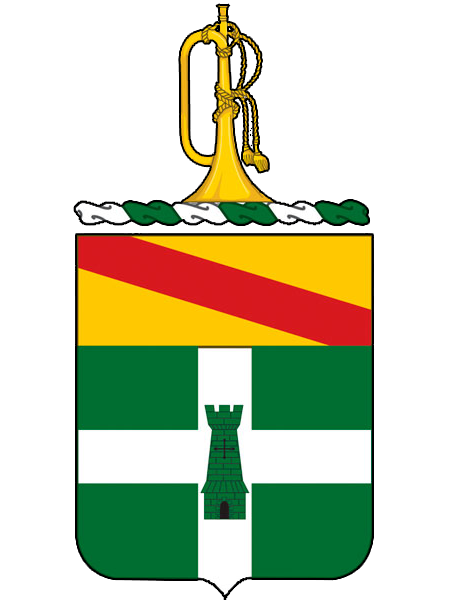"Coat of Arms of the 3rd Cavalry Regiment"
"Ultimately, 1,400 police officers were recruited, about 60 percent of whom were Sunni Arabs, many of them from elsewhere in Iraq. In addition, the city has about 2,000 Iraqi troops, and a working city council and an activist mayor. A few feet from where the city council meets is a new Joint Operations Center, set up to collect intelligence tips and act on them. The Army officer running the center, Lt. Saythala Phonexayphoua, said he has been surprised by the amount of "actionable intelligence" troops receive.
Phonexayphoua noted: "We get cell phone calls — ‘There’s an insurgent planting an IED.’ "
Last summer, there were about six insurgent attacks in the area each day. Now there is about one, according to U.S. military intelligence." Washpost
————————————————————————————————–
Hallelujah!! Someone gets it! McMasters should be jumped a couple of grades to major general. "Always reward success," Napoleon said. Always! Colonel McMasters is a man deeply learned in history. History is a much neglected thing these days in the US Army. Let us hope that he does not suffer for his learning.
Pat Lang
http://www.washingtonpost.com/wp-dyn/content/article/2006/02/15/AR2006021502586.html
http://www.carson.army.mil/UNITS/3RD%20ACR/main%20pages/HOMEPAGE.htm



COL,
Instead of jumping him a few grades, we’ll just pull him and his whole unit out of there. And the new mayor will go with them (see article). So no, we still don’t get it.
Sigh.
At least a little more truth made it into our dulled media. I enjoyed the observation that 3ACR’s success could be replicated throughout Iraq – just needs a (whole) lot more troops (probably more than we even have in uniform). Then again, we’re not really in it there to win are we?
SP
“Col McMaster, a man after my own heart (I would like to think), has taken a refreshingly unconventional approach to his mission. By using academics and Middle East experts as advisers, he sought to educate his men about the intricacies of Tal Afar. Successfully, it would seem, for his forces won over at least some of the disillusioned Turkmen population at the same time as isolating the relatively small cadre of die-hard extremists. The extent of his success is, I believe, reflected in the high numbers of extremists accounted for, both killed and captured, despite an elaborate system of tunnels under their positions that led out to the countryside and should, theoretically, have -enabled even more to escape.”
Col Tim Collins Royal Irish Regiment (Retd)
http://telegraph.co.uk/opinion/main.jhtml?xml=/opinion/2005/09/18/do1801.xml/main.jhtml?xml=/opinion/2005/09/18/do1801.xml
Great report! Thanks for posting it. It’s nice to see a Colorado unit doing great work (I live 3000′ up the front range from Fort Carson were I spent the worst year of my military service.).
I agree that The Mc needs to be recognized for his skill in dealing with insurgencies. OTOH, you know this isn’t the Military Way (as I recall it). First we gotta get a brass commission to evaluate if this was really an improvement. Then a Board needs to be convened on implementing the obvious.
But I gotta admit, I recall an Army from the late 60s. I certainly hope things have changed in the Head Shed since then. But I did keep the choppers flying at Ft. Carson and covered the SF in Viet Nam as a door gunner. Anyway, maybe we’ll both be surprised in this case.
I certainly hope so. Otherwise we’ve just pissed away a year’s effort in Tall Afar.
Col. McMasters is clearly bright and a real soldier. However, he is leaving Iraq.
And, oh yes, I also saw this at the end of the article —
“With the current number of American troops in Iraq, it would be impossible to copy the approach used here, with outposts every few blocks.
“Baghdad is a much tougher nut to crack than this,” said Maj. Jack McLaughlin, Hickey’s plans officer, who attended Robinson Secondary School in Fairfax, Va. Standing in the castle overlooking the city, he said, “It’s a matter of scale — you’d need a huge number of troops to replicate what we’ve done here.”
So, given the overall policy on waging war in Iraq, what impact will Col. McMasters’ work have?